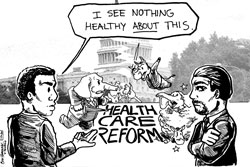A poll from the Monmouth University Polling Institute found that 45 percent of New Jerseyans support the Affordable Care Act (ACA), while 49 percent oppose it. After compiling the data of 803 respondents between March 30 and April 1, the poll detailed the Garden State’s response to essential questions dealing with the efficacy of both governmental figures, as well as the ACA itself
But what is the Affordable Care Act? According to the American Public Health Association the program is national health reform, which seeks to “expand [health] coverage to 25 million Americans by 2023.” By providing increased coverage throughout the nation, the plan aims to rectify the high rate of uninsured Americans, of whom the Congressional Budget Office estimated there were 57 million in 2013.
Patrick Murray, Director of the Monmouth University Polling Institute, said that despite the statistics, New Jersey residents are still more confident about the ACA than residents from other states.
Murray said, “You have to keep in mind that New Jerseyans are a little more positive about Obamacare than the nation as a whole. They are just not as positive as they were before the enrollment period began in October.” Much of the negativity towards the policy stemmed from the faulty launch of the ACA’s website in October 2013.
Murray continued, “Glitches with the website had a significant impact on public opinion.” The defective implementation of the website essentially, as Murray said, “made a bad first impression, which can be damaging when the public doesn’t have a solid base of experiences to go on yet.”
The poll also identified that New Jerseyans understood the crux of the legislation. When asked to identify the main portion of the policy, 73 percent New Jersey residents correctly answered that the law requires Americans to be insured or otherwise pay a fine.
Despite New Jerseyan’s general understanding of the law, the ACA is still largely theoretical. As the enrollment period ended March 30, 2014, the true force of the bill has yet to be felt. Kathy Maloney, Director of Monmouth University Health Services said, “The impact of the ACA will not be realized until several fiscal cycles have been completed.”
Looking at the economic aspect of the ACA, the individual finances are extremely important. Since the policy requires most Americans to either pay for coverage or pay a tax, the policy takes no shortcuts in confronting individuals and their monetary situations. Maloney said, “The taxable component of the ACA allows citizens to weigh the cost of an insurance plan against the cost of the taxation penalty.” She continued, “As the penalty amount increases, so does the incentive to enroll.” Whereas the individual could formerly analyze opting into health coverage by considering his or her own wellbeing and physical condition, the American Care Act shifts the analysis to a cost-benefit comparison of one’s financial standing, according to Maloney.
As reported by the New Yorker, young people are less likely to buy into the ACA as they tend to perceive themselves as (and typically are) healthier than much of society. So for young people, buying health care is less about individual wellbeing and more about the financial capability to purchase insurance.
In the eyes of students though, the ACA receives a mixed bag of reactions. Michael Hamilton, a junior political science major said, “I think healthcare should be left to the states because each state has its own individualistic needs. How do you account for all the micro-necessities unique to the states when it’s a federal law?”
Maria Pahountis, a senior health studies major offered another perspective, having extensive experience in the health services industry. “Working at a multi-specialty pain management facility for over six years I have seen extreme changes in the type of coverage patients have.” She continued, “as a student I can see that many people our age and even into their late 20s are opting not to get health insurance because of its high costs.” She believes that one major problem with the plan is the discrepancies between options available for different socioeconomic classes, with the ACA lacking assistance for the middle class.
Matt Lang, a junior political science major believes “The ACA was designed to help students.” He said, “Now that college graduates are able to remain on their parent’s insurance plans until they’re 26, they can establish themselves in a desired career before having to worry about getting insurance. ”
PHOTO TAKEN from www.sodaheadd.com



